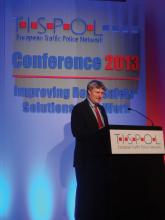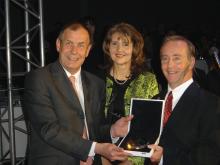Paul Nordengen of South Africa's Council for Scientific and Industrial Research (CSIR) introduces a comprehensive self-regulation initiative to improve road wear, road safety and transport productivity in South Africa

Paul Nordengen, research group leader of network asset management systems for CSIR
Paul Nordengen of South Africa's Council for Scientific and Industrial Research (CSIR) introduces a comprehensive self-regulation initiative to improve road wear, road safety and transport productivity in South Africa
In most countries throughout the world, heavy vehicle use on road networks is controlled predominantly by prescriptive regulations.These regulations differ significantly from one country to another, and efforts to achieve regional harmonisation and effective road use have met with limited success.
The
We met with Paul Nordengen, research group leader of network asset management systems for CSIR, who explained that the PBS system, or 'Smart Trucks' initiative, involves setting standards to specify the performance required from the operation of a given vehicle on a network, rather than prescribing how the specified level of performance is to be achieved.
This approach allows more flexibility for vehicle designers to utilise innovative solutions and the latest available technology to meet the required performance standards.
"Although inspired by successful experience in Australia, Canada and New Zealand, the concept is particularly adapted to developing countries," he emphasised.
The CSIR identified the application of PBS in the heavy vehicle sector as a key research area. It was decided to design, manufacture and operate a number of 'Smart Truck' demonstration vehicles to gain practical experience as well as quantify and evaluate the potential infrastructure preservation, safety and productivity benefits for road freight transport. Two demonstration projects were implemented in the forestry sector.
As Nordengen explains: "You can actually 'match' vehicles to the specific routes and road infrastructure. Where the conditions permit, vehicles longer than those normally permissible under national regulations can access a limited subset of the road network, resulting not only in enhanced safety but also greater productivity.
MONITORING AND ASSESSMENT
Data collected and monitored monthly includes payload per trip, average trip speeds, kilometres travelled per month, average monthly fuel consumption, maintenance costs and records of incidents and accidents. The results indicate improved productivity (also fuel efficiency), improved safety performance and a reduction in CO2 emissions. Such higher productivity vehicles can also reduce the number of trucks needed to transport the same ratio of freight by more than 15-20%.To assess the road wear between the PBS and baseline vehicles, the CSIR's pavement design software, MePads, was used. The software combines a stress strain computational engine with pavement material models developed at the CSIR.
Taking into account the different permissible maximum payloads on each vehicle, the average road-wear costs per km per tonne of payload transported (South African cents/tonne/km) were calculated for each vehicle type (see table 1).
THE RESULTS
The 'Smart Trucks' were more road friendly than the baseline vehicles by up to 23%. The positive performance has resulted in the approval of 30 additional permits for 'Smart Truck' demonstration vehicles in the forestry industry, primarily for a more effective evaluation of safety performance. Projects are also underway in the mining, car carrier and general freight sectors.COMPLIANCE AND ENFORCEMENT
The proof of any system lies in its levels of compliance and enforcement."This tends to be particularly true in the developing world due to added problems like bribery and corruption, which tend to be more prevalent in poorer countries where salaries are low," observes Nordengen.
"We've thus looked at self-regulation initiatives to try to involve the industry from a corporate governance viewpoint. Our work in requiring transport contractors to comply with certain minimum standards through an accreditation system has also been based on experience in Australia. This approach is currently echoed by the International Organisation for Standardisation, which is developing a new standard (ISO 39001) for road traffic safety management systems." South Africa's Road Transport Management System (RTMS), for which Nordengen serves on the National Steering Committee, complements the PBS approach by providing a voluntary, selfregulation scheme that encourages consignees, consignors and road transport operators to implement a management system.
CHANGING THE CULTURE
Nordengen's outlook has become holistic as he recognises the multiple knock-on benefits of the new approach."I started in the area of self-regulation primarily from an engineering perspective, with the aim of discouraging overloading and reducing road wear. I began to realise, however, the huge potential safety benefits of self-regulation." Road safety is thus much more than an infrastructure issue: it's a social issue, a health issue and much more. For Nordengen, the key lies in changing the culture of how people, 'do' transport.
"We found some transport companies don't comply with regulations because they think they can make more profit by overloading their vehicles, not maintaining them and not measuring their productivity. And yet, when they are compelled, for example by a consignor, to demonstrate that they are implementing sound management systems, they soon start to realise that they can run their businesses more profitably by doing things more professionally.
Proper maintenance not only enables vehicles to work longer and more efficiently, it also represents an investment in safer fleets."
REWARDING RESPONSIBILITY
Nordengen stresses that efforts to raise awareness need to be complemented by reward incentives to transporters who do behave diligently and responsibly.Our approach holds huge potential benefits for industry and we are making RTMS accreditation an essential pre-requisite for participation in the 'Smart Truck' initiative. You must supply comprehensive information on an ongoing basis as well as be generally transparent in your operations. "With the selfregulation/ accreditation system you are able to put more responsibility on the operators themselves, and thus there is less need to rely on the vagaries of external enforcement."
CONTINUAL IMPROVEMENT, FOCUSED ENFORCEMENT
The accreditation system must be credible and independent. Nordengen highlights an added dimension that reinforces the concept."The other principle of self-regulation, as advocated by the CSIR, is continual improvement. Thus, it's not enough for an operator to merely meet the basic requirements of the standards. He will need to demonstrate year-on consistency and dynamic evolution - for example in terms of constantly maintaining and improving driver training." The auditing process has been entrusted to the
"If instances of non-compliance are noted, the operator typically receives a 'corrective action report', which stipulates a deadline by which appropriate remedial measures must be taken to avoid losing accreditation," explains Nordengen.
Table 1: Road wear costs (in SA cents) for three baseline and the two PBS vehicles
| Vehicle Description | Combination mass (kg) | Payload (kg) | Average Road Wear Cost (c/km) | Average Road Wear Cost (c/tonne km) |
| Baseline: 5-axle articulated | 43200 | 28150 | 296 | 10.6 |
| Baseline: 6-axle articulated | 49200 | 31900 | 299 | 9.4 |
| Baseline: 7-axle rigid-drawbar | 56000 | 38400 | 324 | 8.4 |
| PBS 1 (Sappi) | 65400 | 46200 | 375 | 8.1 |
| PBS 1a (400mm wheel spacing) | 65400 | 46500 | 337 | 7.3 |
| PBS 1b (450mm wheel spacing) | 65400 | 46200 | 324 | 7.0 |
| PBS 2 (Mondi) | 64250 | 45200 | 375 | 8.3 |
| PBS 2a (Steer axle - 7 200 kg) | 64250 | 45200 | 363 | 8.0 |
"This removes the enforcement burden from the traditional law enforcement authorities, which are frequently overworked, understaffed and underpaid. Self-regulation should most definitely not be viewed as 'no enforcement', however. It is more akin to 'enforcement by someone else' - I cannot emphasise enough that our approach is aimed at complementing rather than replacing the traditional law enforcement mechanisms. Once the official law enforcement authorities gain confidence in such voluntary accreditation schemes, they are able to identify accredited operators and perhaps subject them merely to spot checks. This will enable them to concentrate on the non-accredited 'cowboy' operators. It eventually allows for more efficient, and more focused law enforcement."
Paul Nordengen is currently president of the International Forum for Road Transport Technology (IFRTT), which hosts a biennial Heavy Vehicle Transport Technology (HVTT) Conference.
The next in the series will be held in Stockholm, Sweden, in September 2012, and PBS will be among the comprehensive range of themes addressed. For more details visit: %$Linker:










